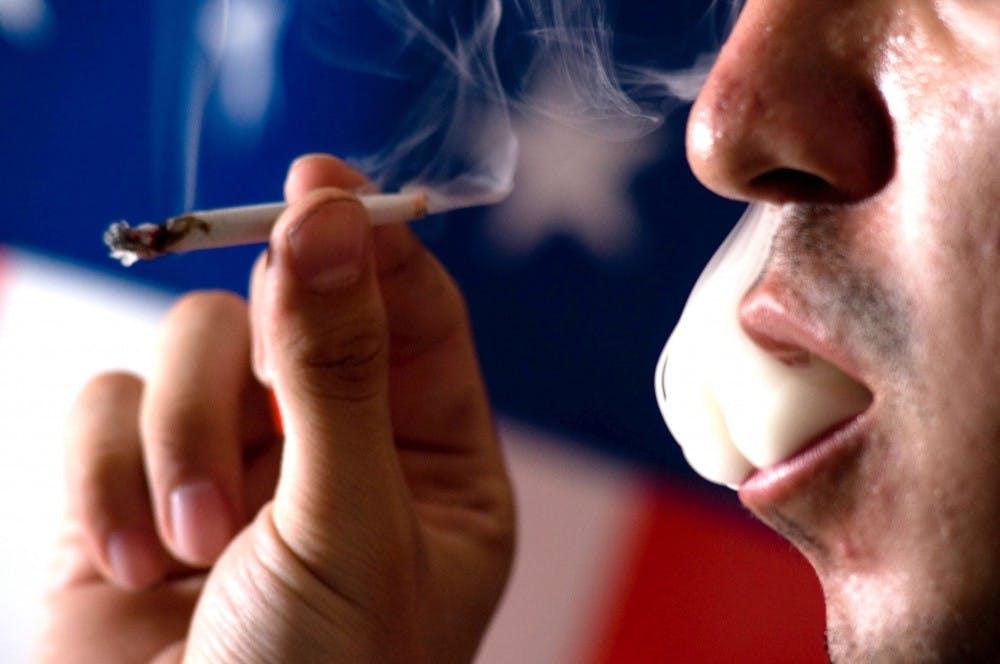Students with a medical marijuana card can be arrested for marijuana possession or usage on campus. However, students are allowed to possess prescription painkillers.
Medical marijuana users on ASU's Tempe campus have faced consequences for marijuana use on ASU property due to the University’s dry-campus policy.
Media representatives from ASU declined to be interviewed but released a statement regarding the issue.
According to the statement, the University counts on-campus marijuana usage as a violation of both state and federal laws. Arizona’s medical marijuana law also prohibits marijuana on campus.
"Students who commit violations of the Student Code of Conduct that involve marijuana are guided to a variety of substance abuse resources provided by the University, and they may be subject to disciplinary action, ranging from probation to expulsion, depending on the nature of the violation," according to the statement.
Biomedical science and psychology junior Erik Vessey, who suffers from brain cancer, said it’s difficult for him to not smoke on campus, even though he has an Arizona medical marijuana card, due to the University's policy.
“I pretty much use it when I get headaches or nausea, which is what I wake up with almost on a daily basis,” he said. “I try not to go to school high.”
Vessey said he believes there should be special accommodations for students in need of medical marijuana. He said this could be achieved through designated smoking locations on campus.
“I feel like maybe there should be designated smoking areas, especially for those who really do need it,” he said. “If they’re living in dorms … and they have some sort of an ailment, then that could be very beneficial. But I can also understand how they don’t want people coming to school high.“
Vessey said he has had poor personal experiences with painkillers and doesn’t understand why medical usage of painkillers are allowed on campus while medical marijuana is not.
“At first, you’ll follow the regular dosage, and then you’ll build a tolerance and you’re going to want more, and it eventually impairs you worse than what marijuana would do,” he said. “Some people are irresponsible with it and can sell it to other people.”
Blaire Martinez, a former ASU community mentor, said she had dealt with at least five students who violated the dry-campus policy with marijuana during her employment.
Martinez worked in the Sonora Center, which is a residence hall on the outskirts of campus. She said many students with the need to smoke simply went across the street to do so.
“We were so close to the outskirts of campus we used to say — as CMs — that we understand that people are in college,” she said. “So we would say, ‘Just be smart. Don’t do that on campus because there are repercussions for your actions.’”
According to the ASU student services manual, painkillers are not included in the list of prohibited items, which do include marijuana, alcohol and other illegal drugs.
Digital culture senior Andre Maestas, who also owns a medical marijuana card, said that even though marijuana is kept off campus for the most part, there is still the problem of students abusing drugs in the dorms.
“I know ASU does not have a punitive policy against the medical use of Oxycodone,” he said. “They don’t have a policy against the medical use of a lot of much harsher, much harder drugs, which at the same time, are being abused in the dorms — are being abused on campus.”
Maestas said he has been arrested for possessing medical marijuana on campus.
“When I was caught on campus with medical marijuana, and I had a medical marijuana card, it was more like a slap on the wrist,” he said. “They took me to counseling and moved me to a dorm by myself.”
However, Maestas said he was still restricted from smoking and ended up being arrested for it a second time.
“I was actually arrested, and it ended up resulting in initially being charged as a felony, which is completely outrageous for somebody who has a medical marijuana card and a disability … or a need for medical marijuana, like I do," he said.
In light of his arrest, Maestas said he and his lawyer are challenging the constitutionality of a house bill passed in response to the citizen initiative Prop. 203, which allowed controlled marijuana use for those with specific medical needs.
“We’re saying that what (the house bill) did was unconstitutional,” he said. “It violates the Voter Protection Act.”
Prop. 105, also known as the Voter Protection Act, was passed to prevent the legislature or governor from interfering with initiatives created by citizens and states that any amendment to a citizen's initiative must be done to further such initiative.
Maestas said the house vote should be considered unconstitutional under Prop. 105 because it did not further the purpose of Prop. 203.
“By recriminalizing something that had been decriminalized, that actually does not further the (initiative), it goes against the (initiative),” he said. “It subjects people to criminal penalties, it doesn’t protect them from it.”
Reach the reporter at angel.n.mendoza@asu.edu or follow @angelnikolas96 on Twitter.
Like The State Press on Facebook and follow @statepress on Twitter.




